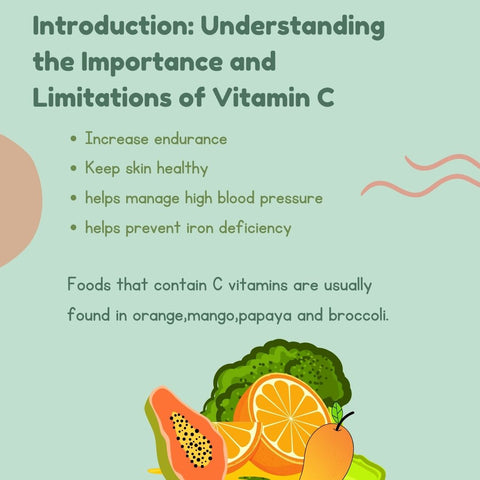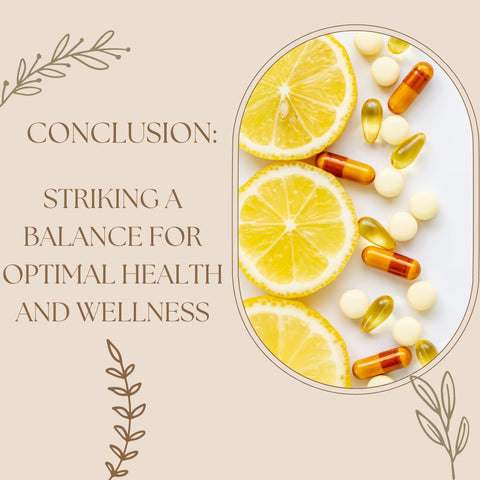Ascorbic acid, another name for vitamin C, is a necessary nutrient that is vital for many body processes, such as the production of collagen, immune system support, and antioxidant defence. Although vitamin C is typically regarded as safe and healthful, taking too much of it may have negative effects.
Introduction: Understanding the Importance and Limitations of Vitamin C

Ascorbic acid, also known as vitamin C, is a water-soluble vitamin that is well-known for being essential to preserving human health. Vitamin C, which is widely known for its antioxidant qualities, is necessary for the production of collagen, the immune system, and the absorption of non-heme iron from plant-based diets. Although this vitamin is essential for general health, it is important to recognise its limitations as well as its importance.
Highlighting the Benefits and Roles of Vitamin C in Health and Wellness
Ascorbic acid, another name for vitamin C, is an essential nutrient that has many advantages for general health and well-being. It is essential for many physiological processes and plays a variety of roles in the body that go beyond that of a simple vitamin.
-
Protection Against Free Radicals: As a strong antioxidant, vitamin C counteracts free radicals, which can lead to oxidative stress and cell damage. This antioxidant's ability to fend off chronic illnesses and promote anti-aging mechanisms
-
Integrity of Connective Tissue: Vitamin C is essential for the synthesis of collagen, which is a structural protein that is necessary for blood vessels, skin, bones, and cartilage. This promotes skin elasticity, wound healing, and general tissue repair by ensuring the preservation of connective tissues.
-
White Blood Cell Function: Vitamin C improves the development and functionality of lymphocytes and phagocytes, two types of white blood cells. To protect the body from infections and illnesses, the immune system must respond vigorously.
-
Encouraging Iron Uptake: Vitamin C helps prevent iron-deficiency anaemia by promoting the absorption of non-heme iron from plant-based diets. This makes it particularly valuable for individuals following vegetarian or vegan diets.
-
Blood Vessel Integrity: Vitamin C helps maintain the health of blood vessels by encouraging the synthesis of collagen and bolstering antioxidant defences. Preserving healthy blood flow and vascular integrity, may help lower the risk of cardiovascular illnesses.
-
Support for Brain Function: Vitamin C plays a role in the synthesis of neurotransmitters like norepinephrine and serotonin. These chemicals play a role in mood regulation, stress response, and overall cognitive function.
-
Strong Antioxidant: Vitamin C shields the skin from UV rays and other environmental toxins by acting as a powerful antioxidant. Additionally, it encourages the synthesis of collagen, which supports a clear and healthy complexion.
To achieve these health benefits and preserve general well-being, include foods high in vitamin C, such as citrus fruits, berries, broccoli, and peppers, in a balanced diet. However, it is important to find a balance because taking too much of it might have negative effects. Knowing the many functions of vitamin C enables people to make wise decisions for a healthy lifestyle.
Potential Risks Associated with High-Dose Vitamin C Consumption

Although vitamin C is generally regarded as safe when taken by recommended dosages, high-dose supplementation carries some risk and may cause adverse effects. It is imperative to be cognizant of these hazards, particularly for those who might be inclined to overindulge on dosages under the mistaken impression that greater is always preferable. The following are some possible dangers connected to taking large amounts of vitamin C:
-
Gastrointestinal Distress: High doses of vitamin C, typically exceeding 2,000 milligrammes per day, can lead to gastrointestinal issues such as diarrhoea and abdominal cramps. This is explained by the osmotic action of intestinally stored unabsorbed vitamin C.
-
Kidney Stones: Consuming too much vitamin C can cause the body to accumulate oxalate, which may raise the risk of kidney stones developing. Individuals with a history of kidney stones or predisposition to oxalate-related issues should be cautious with high-dose supplementation.
-
Iron Absorption Interference: Vitamin C can improve the absorption of non-heme iron from plant-based foods, but it can also hinder the absorption of heme iron from animal products, potentially leading to iron overload. This could result in iron overload in people who take a lot of vitamin C and iron supplements.
-
Interactions with Medications: High vitamin C doses may interact with medications such as anticoagulants and chemotherapy. Before taking high-dose vitamin C supplements, consult a healthcare professional, especially if you are currently undergoing medical treatment.
-
Potential Prooxidant Effects: High concentrations of vitamin C can act as a prooxidant, despite its primary antioxidant role. This means that it may produce free radicals in certain circumstances, potentially causing cellular damage. This prooxidant effect is rarely observed at normal dietary levels.
-
Digestive Upset: Some individuals may experience nausea or vomiting with high-dose vitamin C supplementation. This is more likely to happen when you take vitamin C on an empty stomach.
It is critical to emphasise that these risks are associated with extremely high vitamin C doses, frequently exceeding the recommended dietary allowances. The majority of people can get enough vitamin C from a well-balanced diet rich in fruits and vegetables without the need for supplements. Before considering high-dose vitamin C supplementation, people should consult with a doctor to determine their specific needs and risks.
Examining Gastrointestinal Distress and Kidney Stone Formation
1. Gastrointestinal Distress:
-
Mechanism: High vitamin C intake can cause gastrointestinal distress, particularly diarrhoea and abdominal cramps. This is due to the osmotic effect of undigested vitamin C in the intestine. When the concentration of vitamin C in the intestines is excessive, it draws water in, resulting in loose stools and abdominal discomfort.
-
Risk Factors: Everyone has a unique threshold for experiencing gastrointestinal distress. Some people may be more sensitive to elevated vitamin C levels than others. Symptoms are more likely to occur at doses greater than 2,000 milligrammes per day.
-
Mitigation: To reduce the risk of gastrointestinal distress, people considering vitamin C supplementation should start with low doses and gradually increase until they find their tolerance. Taking vitamin C with meals may also help to reduce the likelihood of digestive upset.
2. Kidney Stone Formation:
-
Mechanism: Excessive vitamin C intake can lead to kidney stone formation by increasing oxalate levels. Vitamin C is converted to oxalate in the body, and high oxalate levels in the urine can cause calcium oxalate stones in the kidneys.
-
Risk Factors: People with a history of kidney stones or who are prone to oxalate-related problems should exercise caution when taking large amounts of vitamin C. Individuals who are predisposed to kidney stones may be more likely to develop them, particularly if they already have high oxalate levels or impaired kidney function.
-
Mitigation: Adequate hydration can help dilute oxalate levels in the urine, potentially lowering the risk of kidney stone formation. Individuals at risk must consult with healthcare professionals before considering high-dose vitamin C supplementation.
Understanding the Impact on Iron Absorption and Oxalate Levels
-
Impact on Iron Absorption:
-
Mechanism: Ferric iron is converted to ferrous iron by vitamin C, which is more easily absorbed in the intestines, improving the absorption of non-heme iron (found in plant-based diets). This is especially helpful for people who eat a vegetarian or vegan diet because heme iron from animal sources is more easily absorbed than iron from plants.
-
Positive Effects: People who consume less meat are more likely to avoid iron-deficiency anaemia if they consume enough vitamin C. It is common dietary advice to consume foods high in vitamin C in addition to plant-based iron sources because of the synergistic relationship between vitamin C and iron absorption.
-
Risk of Iron Overload: Improving non-heme iron absorption can be advantageous for certain people, but it is important to take into account any possible risks, particularly in populations where iron overload is already a possibility. Elevated blood iron levels may be caused by a combination of high-dose vitamin C supplementation and excessive iron consumption.
2. Impact on Oxalate Levels:
-
Mechanism: The body breaks down vitamin C into oxalate, which can lead to kidney stones when consumed in excess. Although oxalate is typically eliminated through the urine, elevated levels can cause calcium oxalate stones to form in the kidneys.
-
Risk factors: People who are prone to kidney stones, such as those who have had kidney stones in the past, should exercise caution when taking high-dose vitamin C supplements. Megadoses of vitamin C can aggravate elevated oxalate levels, raising the possibility of kidney stones developing.
-
Mitigation: To help dilute oxalate in the urine and lower the risk of stone formation, it is important to drink enough water. Additionally, keeping a balanced diet and limiting vitamin C intake can help reduce the chance of having high oxalate levels.
Exploring Vitamin C Interactions with Medications and Health Conditions
Comprehending how vitamin C interacts with drugs and medical conditions highlights the need for tailored healthcare advice. While vitamin C is generally safe when taken at suggested dosages, those who are on certain medications or have certain medical conditions should speak with a healthcare provider before thinking about using supplements. This guarantees the safe and efficient incorporation of vitamin C into the management of general health.
Expert Insights and Recommendations on Vitamin C Intake

Expert guidance and recommendations on topics like vitamin C intake, the RDA, food sources, supplementation, moderation in supplementation, medication interactions, tailored strategies, tracking high-risk populations, managing oxidative stress, public education, and long-term health advantages. For individualised guidance, always seek the opinion of medical specialists, particularly if you are thinking about using supplements or if you have any particular health issues. Expert advice guarantees that vitamin C consumption is in line with personal requirements and health objectives.
Providing Guidelines on Optimal Vitamin C Consumption Levels
Recommendations for the Ideal Amount of Vitamin C Consumption:
-
Observe the RDA (Recommended Dietary Allowances): Respect the suggested dietary allowances, which change according to age, gender, and stage of life.
-
Diverse and Colorful Diet: Eat a wide variety of vibrant fruits and vegetables every day. Citrus fruits, strawberries, kiwis, bell peppers, broccoli, and other leafy greens are rich sources of vitamin C. In addition to vitamin C, a balanced diet offers several other vital nutrients.
-
Consider Specific Needs: If you have specific dietary restrictions, malabsorption issues, or medical conditions that necessitate vitamin C supplementation, consult with a healthcare professional.
-
Avoid Excessive Supplementation: Megadoses of vitamin C should be avoided unless under medical supervision. Excessive supplementation may cause gastrointestinal distress and kidney stone formation.
-
Understand Individual Requirements: Individual vitamin C requirements can vary depending on age, gender, lifestyle, and health status. Pregnant or breastfeeding women, smokers, and elderly people may have different requirements.
-
Monitor Medication Interactions: If you are taking medications, particularly anticoagulants or chemotherapy drugs, consult your doctor before taking high-dose vitamin C supplements. Interactions can affect treatment efficacy and safety.
-
Emphasise Food Sources: Prioritise obtaining vitamin C from food sources over supplements. Whole foods contain a variety of nutrients, fibre, and phytochemicals that are beneficial to overall health.
-
Hydration for Kidney Stone Prevention: If you have a history of kidney stones or are at risk, stay well hydrated. Hydration helps to dilute oxalate in the urine, lowering the risk of kidney stone formation caused by high vitamin C intake.
-
Consider Personal Health Conditions: Individuals with iron overload disorders or certain genetic conditions should be cautious about vitamin C intake. Consult a healthcare professional for advice on how to tailor your vitamin C consumption to your specific health conditions.
-
Educate Yourself: Learn about the vitamin C content of different foods and how dietary choices affect overall nutrient intake. Knowledge enables you to make informed dietary decisions.
-
Balance and Moderation: Strive for balance and moderation in your dietary choices. A well-rounded approach to nutrition, including optimal vitamin C intake, supports long-term health and well-being.
Remember that optimal vitamin C consumption is part of a larger strategy for overall health. Individual needs vary, and consulting with healthcare professionals provides personalised advice based on your specific situation.
Emphasizing the Importance of Monitoring Intake and Personalized Nutrition
Emphasising the Significance of Monitoring Intake and Personalised Nutrition:
-
Individual Variability: Recognise that nutritional requirements differ between individuals based on age, gender, health status, and lifestyle. What works for one person may not be right for another.
-
Regular Monitoring: Evaluate your dietary habits and nutritional intake at regular intervals. This includes tracking your vitamin C intake, as well as other essential nutrients. Adjust your diet as necessary to meet changing health needs.
-
Consult Healthcare Professionals: Seek advice from healthcare professionals, such as registered dietitians or nutritionists, to determine your specific nutritional requirements. They can provide personalised advice based on your health status, medical history, and lifestyle.
-
Consider Health Conditions: If you have specific health conditions, consider how they may influence your nutritional requirements. Diabetes, kidney issues, and gastrointestinal disorders can all have an impact on how your body processes and absorbs nutrients.
-
Evaluate Dietary Choices: Regularly assess your dietary choices to ensure they are consistent with your health objectives. This includes assessing the quality and variety of foods in your diet and making adjustments to address any deficiencies.
-
Monitor Supplementation: If you are taking supplements, such as vitamin C, keep track of the dosage and be aware of any potential interactions with medications or health conditions. Adjust supplement intake based on your individual needs and in consultation with healthcare professionals.
-
Hydration Awareness: Pay close attention to hydration, especially if you are consuming high levels of vitamin C. Proper hydration is essential for kidney health and may reduce the risk of kidney stone formation caused by high oxalate levels.
-
Lifestyle Considerations: Physical activity, stress levels, and sleep patterns can all have an impact on your nutritional needs. Adjust your diet to account for these factors and promote overall well-being.
-
Educate Yourself: Stay informed about nutrition and its effects on health. Understand the nutritional content of different foods, including those rich in vitamin C, to make informed choices that align with your individual health goals.
-
Adapt Over Time: Nutritional requirements may change over time due to factors such as ageing, changes in activity levels, or changes in health status. Be prepared to adjust your dietary choices to meet changing needs.
-
Whole-Food Emphasis: Whenever possible, choose whole foods over supplements. Whole foods provide a synergistic combination of nutrients, fiber, and bioactive compounds that contribute to overall health.
A proactive approach to improving one's health can be taken by highlighting the significance of intake monitoring and adopting personalised nutrition. Understanding the dynamic nature of nutritional requirements and obtaining expert advice guarantees that dietary decisions support long-term wellbeing and are in line with personal health objectives.
Addressing Common Concerns and Misconceptions Regarding Vitamin C
Taking Care of Frequently Asked Questions and False Claims About Vitamin C:
-
Myth: "It is Always Better with More". Fact: Although vitamin C is necessary for good health, taking too much of it can have negative effects. Large doses of vitamin C can lead to kidney stones, digestive problems, and other problems; they are not always better.
-
Myth: "The Common Cold Is Prevented by Vitamin C". Fact: Although vitamin C can boost the immune system, its effectiveness in preventing or shortening the duration of the common cold is limited. Regular and moderate intake is beneficial, but megadoses are unlikely to provide any additional cold-fighting benefits.
-
Myth: "Vitamin C Heals COVID-19". Fact: The idea that vitamin C can treat or prevent COVID-19 is unsupported by scientific data. It is imperative to adhere to public health protocols, including immunisation and maintaining proper hygiene, to stop the virus from spreading.
-
Myth: "Every Supplement With Vitamin C Is Identical". Fact: Variations in the absorption rates and bioavailability of vitamin C supplements can occur. The most popular form is ascorbic acid, but some people may absorb other formulations better, such as sodium ascorbate or liposomal vitamin C.
-
Myth: "Vitamin C Causes Kidney Stones". Fact: Consuming too much vitamin C can raise oxalate levels, which may play a role in kidney stone development. On the other hand, moderate dietary intake is usually safe, and staying properly hydrated can help avoid the development of stones.
-
Myth: "Vitamin C Is Only Found in Citrus Fruits". Fact: While citrus fruits are rich in vitamin C, it is also abundant in various fruits and vegetables, including strawberries, kiwi, bell peppers, broccoli, and spinach. A varied diet guarantees sufficient consumption of vitamin C.
-
Myth: "Vitamin C Causes Chemotherapy Interference". Fact: Certain chemotherapy drugs may interact with high doses of vitamin C, potentially affecting treatment outcomes. Cancer patients undergoing chemotherapy should consult with their doctors before taking vitamin C supplements.
-
Myth: "Vitamin C Causes Iron Overload". Fact: While vitamin C enhances the absorption of non-heme iron (found in plant-based foods), it is unlikely to cause iron overload in individuals with normal iron metabolism. However, those with iron overload disorders should be cautious with supplementation.
-
Myth: "Vitamin C is only good for immunity". Fact: Vitamin C plays multiple roles in the body, such as collagen synthesis, antioxidant protection, and cardiovascular health. While it supports the immune system, its benefits extend to various physiological functions.
-
Myth: "Vitamin C Is Not Necessary for Healthy Individuals". Fact: Vitamin C is an essential nutrient that the body cannot produce on its own. It is essential for overall health, and a deficiency can cause scurvy, which is characterised by fatigue, joint pain, and swollen gums.
Addressing these concerns and misconceptions allows people to make more informed decisions about vitamin C consumption and promotes a balanced understanding of its role in health and wellness. It is advisable to consult with healthcare professionals for personalised advice based on individual health conditions.
Conclusion: Striking a Balance for Optimal Health and Wellness

Consuming vitamin C in a thoughtful and balanced manner can lead to maximum health and wellness. People can take use of vitamin C's benefits without running the risk of overindulging by adopting a diversified diet, taking into account their unique needs, and being informed. A lively and healthy existence is ensured by finding a balance in the dynamic and individualised journey towards well-being.















